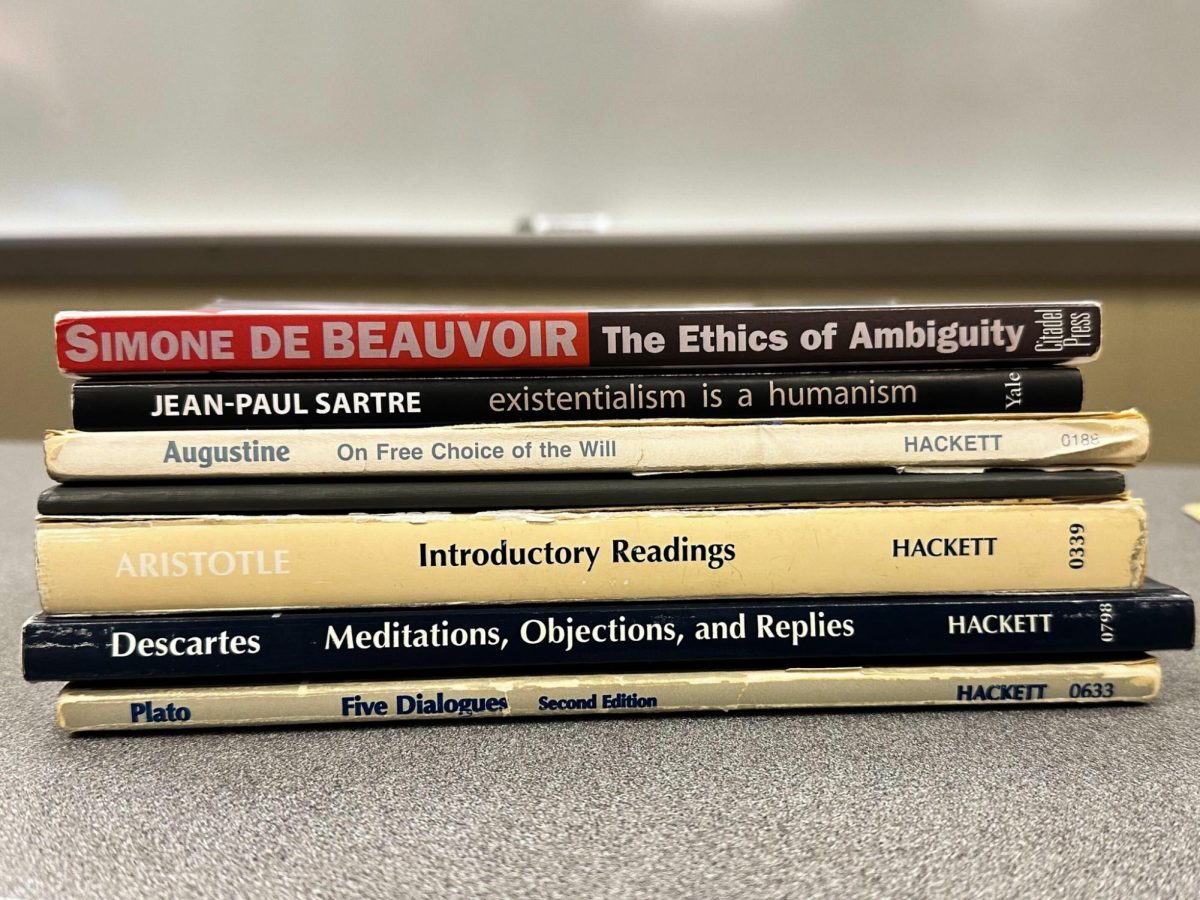At 8:30 a.m., Mari Narvilas sat in her Philosophy of Human Nature (PHIL 1000) class and read Descartes’s “Meditations.” As she had done on many occasions before, Narvilas raised her hand to ask “why” — why give voice to what seemed like the trivial musings of another privileged man?
The readings are under the university’s jurisdiction. By requirement, Philosophy of Human Nature features Plato, Aristotle, Descartes, and St. Augustine or Thomas Aquinas in 60% of covered material. Members of the Fordham community questioned the emphasis on specific Western thinkers as the core revision committee drafted a new core curriculum.
Narvilas, Fordham College at Lincoln Center (FCLC) ’28, studied alongside students from around the world at an international high school in New York City. The curriculum reflected the diverse student body, including Eastern philosophers such as Confucius and Laozi.
By contrast, Narvilas was disappointed by PHIL 1000’s mandated focus on philosophers from the Western canon. Plato and Aristotle’s life stories felt alien to Narvilas.
“It’s astonishing that we study some of these speakers without acknowledging that they’re just like, f—ing racist.” Brian Earl Johnson, Associate Chair of the Philosophy Department
“I don’t feel as strong as a connection to an extremely wealthy man who could spend his time pondering and drinking wine as I might to a woman who’s grown up in an urban environment whose life might have looked a bit more like mine,” Narvilas said.
Associate Chair of the Philosophy Department, Brian Earl Johnson, had choice words for Plato and Aristotle, who were members of Athens’s elites.
“It’s astonishing that we study some of these speakers without acknowledging that they’re just like, f—ing racist,” Johnson said.
Fordham itself has attracted a diverse student body over several years. Reports on the Class of 2028 demographic illustrate that more than half of the incoming class are domestic students of color. Members of the Fordham community have asked if the core curricula reflect the university’s myriad of backgrounds.
“This idea that Plato and Aristotle represent the major crux of ancient philosophy is really an artifact of the history of thought.” Brian Earl Johnson, Associate Chair of the Philosophy Department
Johnson attributed the mandated course description to Fordham being a Jesuit institution. He explained the four to five philosophers mandated in the PHIL 1000 course description are paramount to the history of Catholic theology.
He also said that Plato and Aristotle became more popular as intellectual touchstones in a relatively modern historical narrative.
“This idea that Plato and Aristotle represent the major crux of ancient philosophy is really an artifact of the history of thought,” Johnson said.
The PHIL 1000 curriculum also requires a contemporary philosopher and a figure from a traditionally underrepresented group to accompany these pillars of the Western canon. Johnson said this clause was added to widen the scope of Philosophy of Human Nature classes when the core was last revised in 2009.
Associate Dean Robert Monoit said that he does not expect the emphasis on Western canon philosophers to carry over if the presented core is accepted by faculty.
“The way that came about was precisely coming to contend with the fact that it’s not just the ‘Western canon’ as we conceive of,” Johnson said. “It winds up, as people joke, ‘dead white dudes’ number one, but number two we seem to have constricted it to a very narrow set of dudes.”
According to the university’s core curriculum revision webpage, the core is again under review by FCLC faculty and has been since the 2020-21 academic year. Councils formed of tenure and tenure-track professors will vote to implement a revised core in spring 2025.
According to the minutes of an Oct. 24, 2024 College Council meeting, a proposed new core, created by a committee of nine professors, might dramatically change philosophy requirements. Associate Dean Robert Monoit said that he does not expect the emphasis on Western canon philosophers to carry over if the presented core is accepted by faculty.
“In the design of the new core, that is certainly going away,” Monoit said.
A new core could give professors more independence in choosing course materials. Adjunct Professor Fred Copley, Narvilas’s PHIL 1000 professor, said he would like to make further changes.
“If given the freedom, I would probably switch things,” Copley said. “I just take it that that’s the course I’m being hired to teach. I’m not designing this from scratch.”
In a study by Georgia State University (among others) that Johnson recalled, first-year students took philosophy courses with differing syllabi. The study found classes teaching a wide range of philosophers, including women and contemporary Eastern and Western philosophers, correlated with a dramatic increase in the number of women who majored in philosophy.
Johnson said that Fordham’s philosophy department is working to expand the topics they cover, but they had yet to address the PHIL 1000 class.
Copley said that Fordham contrasts with his experience teaching the philosophy of human nature at other universities, which he said gave him greater freedom to determine course material.
“At some point, that should involve rethinking Philosophy of Human Nature,” Johnson said.
The PHIL 1000 syllabus requirement predated Copley but he hypothesized that the influence of the mandated philosophers landed them a permanent space on syllabi.
“It’s a course on human nature, so I would speculate it might have something to do with thinking about these as figures … offering us particular views of human nature, but you know you could always say ‘well, aren’t there many other philosophers who do the same thing’ and you would be right,” Copley said.
Copley said that Fordham contrasts with his experience teaching the philosophy of human nature at other universities, which he said gave him greater freedom to determine course material. He suggested that Fordham’s emphasis on Greek and Roman philosophers is unusual among other collegiate institutions.
“They basically gave you a list of things,” they said. “You ought to try to cover,” Copley said. “A list of philosophers but a longer list.”
Johnson looked forward to potential changes to the core.
“I’ve been waiting until we get our core revision because, in a way, we’re in a holding pattern. It wouldn’t make sense to design a new core class without knowing what the core is,” Johnson said.
This holding pattern is the current reality of the Philosophy Department. However, Monoit suggested that the proposed new core could include an open-ended “Philosophy and Inquiry” requirement where professors from other departments would explore philosophical ideas. If approved, the change has the potential to reconstruct the way philosophy is taught at Fordham University.


